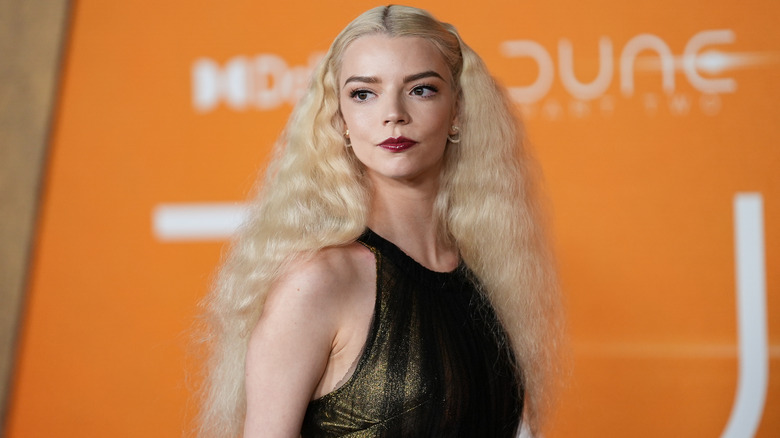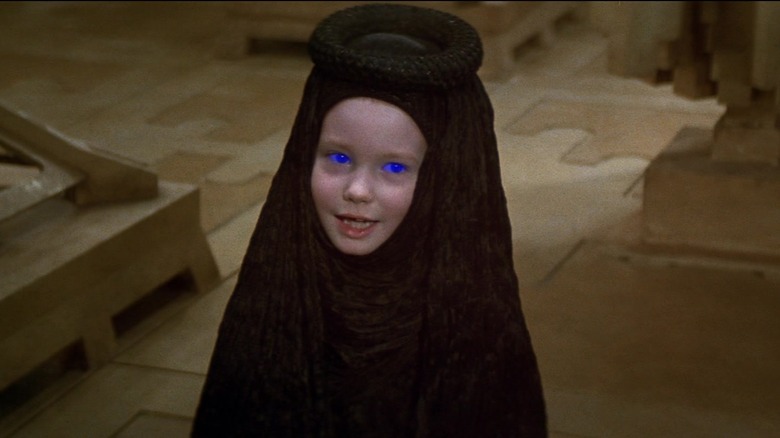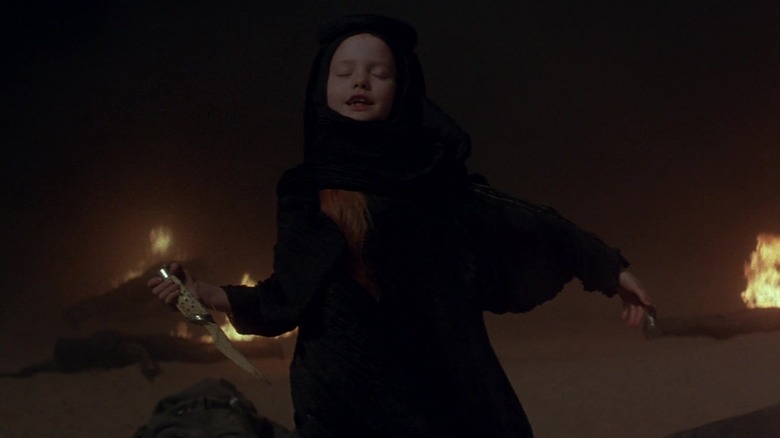The Real Reason Behind Anya Taylor-Joy's Secret Casting In Dune: Part Two
Contains spoilers for "Dune: Part Two"
Maintaining a veil of secrecy about anything in a world filled with TikTok spoilers and well-populated preview screenings can be a trial. But "Dune: Part Two" manages to do just that in how it introduces Alia Atreides and the actor who portrays her, Anya Taylor-Joy, to the proceeding. While Alia remains unborn by the end of the film, changing the general timeline of the science fiction saga, you still hear Taylor-Joy as Alia communicating with her mother, Jessica (Rebecca Ferguson). The character utters, "What is happening, mother?" toward its conclusion. Fans can also spy Taylor-Joy in visions of the future that her brother Paul Atreides (Timothée Chalamet) has.
Taylor-Joy's presence in the film stayed under wraps until the London premiere of "Dune: Part Two." Taylor-Joy confirmed her participation in the movie herself on the red carpet there.
Why did Warner Bros. keep her participation in the movie so hush-hush? Director-writer Denis Villeneuve explained to The Hollywood Reporter that Taylor-Joy's appearance was kept a big secret just for the simple joy of pleasing the film's loyal fanbase. "I think that Hollywood is the most gossipy town on earth, and I wanted, as an experiment, to see how long we could keep a secret. [...] I just loved the idea to keep something a surprise for the audience until the very end; it was like a gift I wanted to keep for the fans." According to Villeneuve, Taylor-Joy's brief appearance in the film was shot in total secrecy in Africa. "Everybody signed with their blood," he joked to Entertainment Weekly.
But just who is Alia Atreides — and what has "Dune: Part Two" already done to change her backstory?
Alia Atreides has a major influence on the latter half of the Dune saga
Who is Alia Atreides? The sister of Paul Atreides, Jessica Atreides' little girl, is something of a wonder even in the landscape of the "Dune" books. She is given the power of speech and super-advanced intelligence in the cradle thanks to Jessica's swallowing the Water of Life (a drowned sandworm's bile) while pregnant. Consequently, the child also bears the knowledge of her ancestors and is born Reverend Mother of the Fremen. Never truly infantile in manner, it's perfectly reasonable of her to kill Baron Vladimir Harkonnen (Stellan Skarsgård) with a poisoned Gom Jabbar when she's but a young child of four.
However, Alia doesn't remain on the side of House Atreides. She is born with a fatal flaw thanks to her exposure to the Water of Life and thus has no central identity. She is constantly at war with multiple ancestral personalities seeking a position in the waking world by using her body as a conduit. Though she captures the love of Duncan Idaho's clone, or ghola, it's easy enough for Harkonnen to shred Alia's sense of self. Harkonnen rises from the tomb and takes over her body.
With his personality at war with dozens for control of her body, Alia eventually leads a coup against Paul when she's named regent after he goes to the desert after losing his vision. The coup fails, but she remains in control during Paul's exile. Ultimately taken over by the Abomination, she has a resurgent Paul slain when he returns in disguise. It is his children who rise to dispatch Alia, who ultimately chooses suicide over an arduous trial that would rid her of The Baron entirely.
Parts of Alia's backstory were already changed for Dune: Part Two
While most "Dune" adaptations have faithfully portrayed Alia's life and death in the book series, it appears that the latest incarnation of the saga may take the character in a slightly different direction.
"Dune Part Two" has reportedly changed Alia's life story in two significant ways. The film ends with Alia still unborn by the time of the conflict between the Freemen and the Sardaukar and Harkonnen armies. Paul's rise to power takes place over several months instead of years, which means not much time has passed between "Dune" and "Dune: Part Two." Even more intriguing is how the movie handles the Baron's death; he meets his fate at Paul's hand. That eliminates one of Alia's first major acts of violence in the "Dune" canon and changes her path toward wickedness and the direct connection between granddaughter and grandfather, which will haunt and ultimately destroy her character. Whether Alia's turn toward villainy is circumvented — or uncomplicated — as she grows to womanhood and the film series moves on to its next chapter remains to be seen.


